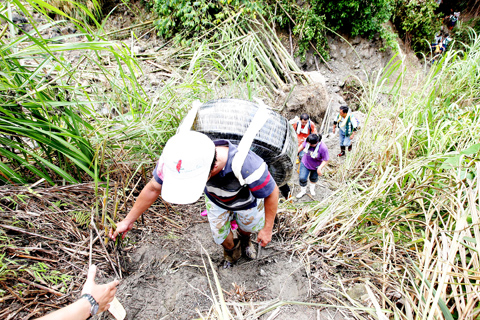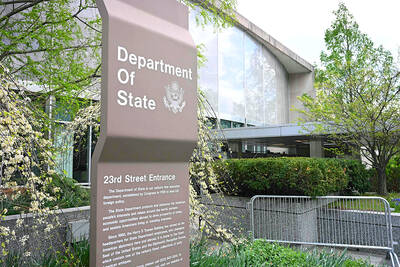For the hundreds of thousands of volunteers who helped out after Typhoon Morakot devastated parts of the country in August, volunteer work was an unforgettable experience.
Landslides and flooding triggered by the typhoon caused the most severe disaster since the 921 Earthquake 10 years ago, leaving more than 640 people dead and 66 missing, the latest numbers by the Central Emergency Operation Center showed two weeks ago.
While there is no official tally of how many people volunteered in relief work, results of a survey by the non-governmental research group Taiwan Thinktank showed that 3.9 percent of Taiwan’s population above the age of 20 — roughly 400,000 people — contributed to cleaning up disaster areas, deliver ng food and necessities, and helping out at shelters or by sorting donated items.

PHOTO: CNA
Liao Wei-cheng (廖偉程), along with two friends, joined more than 50 volunteers organized by Tsou Aborigines to carry canned food, rice, noodles, water, diesel and other necessities into the Alishan (阿里山) region in Chiayi.
While the typhoon did not cause many casualties in the Alishan area, it damaged all the roads — including the Alishan Forest Railroad — and left mountain villages isolated.
Although he is an amateur mountain hiker and a licensed class-B rock climbing instructor, Liao said the trip was harder than he had expected.
“Yet, it was rewarding at the same time,” he said.
Carrying a 20kg backpack, Liao and other volunteers hiked up and down mostly unpaved or collapsed roads.
When crossing rivers with collapsed bridges, “we just had to go down to the bottom of the valley, cross the river by foot, and go up again,” he said.
“The scariest part was when we had to cross a river of about 100m via ropeway,” he said.
Since the ropeway could only hold one person at a time, they had to wait more than an hour before crossing. Some suffered heat stroke while waiting in the midday sun.
“When I was on the ropeway, I looked toward sky and away from the river. My butt must have been less than 30cm from the water. I could feel the water raging underneath,” Liao said. “It only took about 30 seconds, but it felt much longer — it was the most frightening 30 seconds of my life.”
After five hours of hiking, the volunteers finally arrived 200m from Chashan Village (茶山), Alishan Township. But what awaited them was a steep slope, and it began to sprinkle.
“As soon as we reached the village, the sprinkling turned into pouring rain,” he said. “After five hours of hiking, I felt a sense of relief and achievement when I stood inside a house, watching the rain.”
Liao said he only saw smiles on the villagers’ faces and didn’t hear any complaints, just welcome and gratitude.
“Seeing how they managed to live normal lives and remained hopeful despite being stranded, I think I learned a new attitude,” he said. “I should be more satisfied with my life and be as hopeful when running into challenges.”
Liao said he especially admired the young Tsou Aborigines, who took the initiative to organize volunteer teams to help their communities instead of waiting for help.
“I didn’t see anyone from the government or the military along the way — everything depended on the power of the people,” he said.
Government intervention is not always a good thing, as the Kaohsiung-based wedding photographer Joe Yang (楊欣樵) experienced when he helped clean flooded homes in Pingtung City.
Born and raised in Pingtung County before moving to Kaohsiung, Yang felt compelled to join the relief effort.
His father’s family is from Linbian Township (林邊), while his mother’s family is from Jiadong Township (佳冬) — both were heavily flooded when Morakot hit.
“I decided to go to the disaster areas on my scooter right away, but when I got there, I realized I couldn’t even get close because the roads were either under water or mud,” he said. “It was shocking to see that all the places where I used to play as a child were gone. All the streets and landscapes were unrecognizable to me.”
A few days after his first attempt to enter disaster areas, Yang went back to Pingtung and joined a volunteer team organized by the county government.
He did not get to go to Linbian or Jiadong, though, because he was sent to Pingtung City — what he saw there upset him.
“When we were working, Pingtung Mayor Yeh Shou-shan (葉壽山) made an inspection tour. We thought we could ask him for help, but he just didn’t care,” Yang said. “He looked around, took pictures with us and left right away — the entire ‘inspection’ lasted about five minutes at the most.”
This kind of political show, Yang said, did nothing but interrupt their work.
On the other hand, Yang said he was very impressed by some of the storm victims and younger volunteers.
“When we were cleaning up a traditional three-walled brick house, the 70-something owner kept trying to help us,” Yang said. “We told him he could stay home and let us do the work since he was old, but he would not quit helping.”
On the elder man’s face, Yang said he could only see optimism and the will to restore his home.
Yang also saw a group of college students who gave up their summer vacations to serve as volunteers.
“It’s just people helping people, while the government is laid back,” he said.
Meanwhile, 16-year-old Wu Tung-lin (吳東霖) from Taichung spent four days in downtown Liouguei Township (六龜), Kaohsiung County, to help clean mudslide-hit houses.
Because the downtown area wasn’t as bad as the rest of the township, Wu said he had a lot of fun doing volunteer work.
“Before I went, I thought I would be going into the most seriously hit areas to dig up bodies [buried by mudslides] or something of that sort,” he said. “But we ended up only helping clean up houses in the downtown area whenever residents asked for help from the township office.”
The young man said he enjoyed working with people he’d never met, and they often stayed up late talking after a day’s labor.
“I became good friends with some of the other volunteers and we’re still in touch,” he said.
Still, seeing post-disaster Liouguei left Wu speechless because it was drastically changed from the one he visited during the Lunar New Year.
“The power of the typhoon was just shocking,” he said.
While people went into disaster zones to help, thousands of others donated items, helped out at locations to collect these items, and in shelters.
On Aug. 11, more than 200 people showed up at Democratic Progressive Party Taipei City Councilor Chien Yu-yen’s (簡余晏) office in the morning to help sort out, pack and load more than 28 tonnes of donated items onto trucks after she appealed for help on the Internet.
At the same time, hundreds of others — mostly members of the Bulletin Board System PTT — arrived at Liberty Square in Taipei to deliver donations, pack and load them on trucks. Cars and scooters came with load after load of bottled water, food, clothes, flashlights, sleeping bags, brooms and gloves.
The PTT volunteers did not leave the square until they filled the last container with donated items around midnight.
Although the volunteers helped in different ways and at different places, they had one thing in common: They were not tired as long as they could give a helping hand to those who needed it.

Hong Kong singer Eason Chan’s (陳奕迅) concerts in Kaohsiung this weekend have been postponed after he was diagnosed with Covid-19 this morning, the organizer said today. Chan’s “FEAR and DREAMS” concert which was scheduled to be held in the coming three days at the Kaohsiung Arena would be rescheduled to May 29, 30 and 31, while the three shows scheduled over the next weekend, from May 23 to 25, would be held as usual, Universal Music said in a statement. Ticket holders can apply for a full refund or attend the postponed concerts with the same seating, the organizer said. Refund arrangements would

Former president Tsai Ing-wen (蔡英文) on Monday called for greater cooperation between Taiwan, Lithuania and the EU to counter threats to information security, including attacks on undersea cables and other critical infrastructure. In a speech at Vilnius University in the Lithuanian capital, Tsai highlighted recent incidents in which vital undersea cables — essential for cross-border data transmission — were severed in the Taiwan Strait and the Baltic Sea over the past year. Taiwanese authorities suspect Chinese sabotage in the incidents near Taiwan’s waters, while EU leaders have said Russia is the likely culprit behind similar breaches in the Baltic. “Taiwan and our European

Taiwanese indie band Sunset Rollercoaster and South Korean outfit Hyukoh collectively received the most nominations at this year’s Golden Melody Awards, earning a total of seven nods from the jury on Wednesday. The bands collaborated on their 2024 album AAA, which received nominations for best band, best album producer, best album design and best vocal album recording. “Young Man,” a single from the album, earned nominations for song of the year and best music video, while another track, “Antenna,” also received a best music video nomination. Late Hong Kong-American singer Khalil Fong (方大同) was named the jury award winner for his 2024 album

The US Department of State on Monday reaffirmed that US policy on Taiwan remains unchanged, following US President Donald Trump’s use of the term “unification” while commenting on recent trade talks with China. Speaking at a wide-ranging press conference, Trump described what he viewed as progress in trade negotiations with China held in Geneva, Switzerland, over the weekend. “They’ve agreed to open China — fully open China, and I think it’s going to be fantastic for China. I think it’s going to be fantastic for us,” Trump said. “I think it’s going to be great for unification and peace.” Trump’s use of the